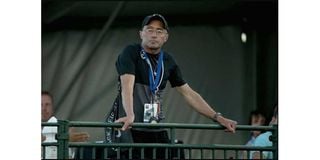Reports: Salazar loses Cas appeal against suspension

In this file photo taken on June 24, 2015 Alberto Salazar, the coach of Galen Rupp, watches the Men's 10,000m during day one of the 2015 USA Outdoor Track & Field Championships at Hayward Field in Eugene, Oregon.
What you need to know:
- The 63-year-old former head of the now-shuttered Nike Oregon Project was suspended in 2019 for a catalogue of drugs violations
- The BBC and The Times both reported Wednesday that Cas had upheld Salazar's suspension following an appeal
- Salazar is already serving a separate lifetime ban from coaching after an investigation by the US Center for SafeSport found evidence of sexual and emotional misconduct
London
Athletics coach Alberto Salazar will serve the entirety of his four-year ban for doping offences after losing an appeal against suspension at the Court of Arbitration for Sport, British media reports said Wednesday.
The 63-year-old former head of the now-shuttered Nike Oregon Project was suspended in 2019 for a catalogue of drugs violations.
The BBC and The Times both reported Wednesday that Cas had upheld Salazar's suspension following an appeal.
Cas was not immediately available to comment on the reports.
Salazar, best known for coaching Britain's four-time Olympic champion Mo Farah, was suspended two years ago during the World Championships in Doha.
It followed an investigation by the United States Anti-Doping Agency which found that Salazar was discovered to have trafficked or attempted to traffic testosterone, given athletes a substance in excess of its permitted limit and tampered with the doping control process of athletes.
Usada said its investigation had uncovered a treasure trove of evidence including "eye-witness proof, testimonies, contemporaneous emails, and patient records."
Salazar, who was also coaching Ethiopian-born Dutch distance running star Sifan Hassan at the time of his suspension, had steadfastly denied wrongdoing.
Salazar is already serving a separate lifetime ban from coaching after an investigation by the US Center for SafeSport found evidence of sexual and emotional misconduct.
That ban, confirmed in July, came after a group of female runners from the defunct Oregon Project said they had been subjected to emotional and verbal abuse by Salazar.
Salazar later admitted making remarks that were "callous or insensitive" but denied that any athlete under his supervision had suffered abuse or gender discrimination.





